|
|
|
Sort Order |
|
|
|
Items / Page
|
|
|
|
|
|
|
| Srl | Item |
| 1 |
ID:
191710
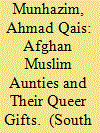

|
|
|
|
|
| Summary/Abstract |
Aunties in South Asia are known for their love, gossip and watchful eye. They are important actors in kinship circles, social fabrics and transgressive possibilities. As a murat/queer person, I always featured in aunties’ gossip and remained under their watchful eye whether I danced, flirted with their sons or crossed boundaries. In discussions of queerness, we oftentimes forget those Muslim Afghan aunties who risk their lives and become armour for queer and trans kids and adults. Through the autoethnography of three Muslim Afghan aunties who each bestowed upon me a gift—a doll, sex education and heels—I situate aunties as central to queer world-making and survival in times of war (and, more broadly, states of emergency and conflict), and I argue that war inadvertently gives aunties the agency to rebel against the heteronormative and masculinist culture of war and create queer worlds for their kinship circles and beyond.
|
|
|
|
|
|
|
|
|
|
|
|
|
|
|
|
| 2 |
ID:
191706


|
|
|
|
|
| Summary/Abstract |
This article chronicles the author’s transformation from an anti-aunty Tamil South Asian socialisation to a more critical acceptance of aunty–ness as a queer ethnographer. Committing to reflexive ethnographic methods, I contemplate on the figure of the ‘invisible aunty’ as a way of disrupting the field while also being self-serving to one’s queer body and psyche. Particularly, in drawing from the nourishing strain of critical aunty dialogue, especially around discourse and subversion, I share how my own research and personal identities have coalesced, allowing for a radical reimagination of once-distant terms and concepts. This return to past discomfort and resistance with soft grace and new ability, I argue, is at the core of the critical aunty—or anti/aunty—method.
|
|
|
|
|
|
|
|
|
|
|
|
|
|
|
|
| 3 |
ID:
191708
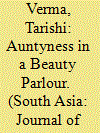

|
|
|
|
|
| Summary/Abstract |
Interactive service work in various middle- and upper-class settings has created visible disparities between those who seek the work and those who provide it. In addition to beauty work, beauty parlours require emotional/affective work, widening the class gap between sellers and consumers by requiring further labour on the part of the worker. However, within the smaller beauty parlours existing in the by-lanes of larger Indian markets, there is the possibility of creating shared space through conversations and care through a mobilisation of ‘auntyness’. In this paper, I explore how the conversations in a New Delhi beauty parlour lead to the creation of aunties that challenges the limits of interactive service work and enables temporary communities of kinship and care that hinge upon the participants’ performances of the styles, affects and values associated with aunties.
|
|
|
|
|
|
|
|
|
|
|
|
|
|
|
|
| 4 |
ID:
191705
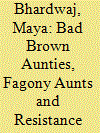

|
|
|
|
|
| Summary/Abstract |
This article offers an urgent complement to the trope of the South Asian aunty as an agent of discipline, shame, heteropatriarchy and tradition by exploring the counter-archetype of the resistance aunty—the radical feminist aunty who holds down social movements—in the South Asian diaspora. This article centres a queer lens on transgressive and activist aunties, and analyses digital and in-person queerings of the aunty in contemporary social and cultural movements. Examining resistance aunties in the writing, performances, interviews and other digital and in-person cultural work of four queer South Asians in the US and the UK, this article asserts the aunty as a core agent of resistance. It develops the notion of the resistance aunty in conversation with activist aunting in Black American organising and scholarship, and locates the legacy of the resistance aunty in queer and trans movements in the Global South and in the diaspora. By applying a new theoretics of resistance auntyhood to studies of aunty labour, this article argues for the importance of queer activist aunties in nurturing and propelling transformative social movements.
|
|
|
|
|
|
|
|
|
|
|
|
|
|
|
|
| 5 |
ID:
191700
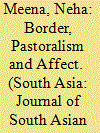

|
|
|
|
|
| Summary/Abstract |
The demarcation of the India–Pakistan border on the western side of Rajasthan in 1947 had profound implications for the pastoral communities there. Based on an archival history of the Thar desert and ethnographic fieldwork in the border villages of Rajasthan, this paper explores how pastoralists interact with the border and the bordering practices of the state. Focusing on the Raika community, the paper examines how borders impact the mobility, identity and traditional life of the pastoralists. Building on Raika memories of mobility and connections across the border, the paper argues that the interactions of the pastoralists maintain an affective relationship with this war and violence affected borderland, despite the administrative practices of surveillance, border maintenance and developmental projects that have produced an environment of insecurity and uncertainty.
|
|
|
|
|
|
|
|
|
|
|
|
|
|
|
|
| 6 |
ID:
191704
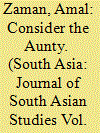

|
|
|
|
|
| Summary/Abstract |
This essay reads the aunties on the peripheries of Hanif Kureishi and Stephen Frear’s film, My Beautiful Laundrette (1985), as minor figures, enacting a methodological turn to the seemingly insignificant in analyses of South Asian culture and sexuality. I ask why the aunties’ desire feels so impossible, especially in a film centred on a Pakistani protagonist’s queer utopia. Both ubiquitous and precluded from a complexity of desire, representations of the Pakistani aunty suffer from a deficit of imagination. Aunties tend to be shown as middle-aged women who surveil and police their kin and have a neutered or absent sexuality, as the film’s paradigmatic figuration of the aunty exemplifies. This article argues that such creative constraint derives from the construction of female sexuality as deviance in South Asia, and then tries to look beyond these constraints. While asking what a more capacious imagining of the aunty and her desires might make possible, I offer parameters for reading sexuality in Pakistan and its diasporas by foregrounding deprivation of pleasure and choice.
|
|
|
|
|
|
|
|
|
|
|
|
|
|
|
|
| 7 |
ID:
191711
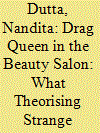

|
|
|
|
|
| Summary/Abstract |
LaWhore Vagistan, a South Asian drag queen, meets Noor, a South Asian beauty salon owner, in this essay to illustrate the kind of work diasporic aunties do for other migrant women. Aunties engage in aesthetic and emotional labour to build diasporic spaces of beauty and intimacy. The affective power of these spaces for migrant women and queer folks becomes legible at the intersections of gender, race and class. In this essay, I employ drag as a lens to understand the work of the diasporic beautician, putting into conversation two aunties who may seem antithetical to each other at first glance.
|
|
|
|
|
|
|
|
|
|
|
|
|
|
|
|
| 8 |
ID:
191703


|
|
|
|
|
| Summary/Abstract |
In February 2016, Union Minister Smriti Irani delivered a torrential speech in India’s Lok Sabha, in which she refuted the need for an apology from her government for the death of Rohith Vemula (a Dalit student at Hyderabad University) or for the arrests and aggravation at Jawaharlal Nehru University in New Delhi, where students had been arrested under specious accusations of sedition. Her melodramatic delivery and grand gestures recalled the theatricality of her soap operatic past as the protagonist of the hit series, ‘Kyunki Saas Bhi Kabhi Bahu Thi’. The morning after this speech, The Telegraph newspaper printed coverage of Irani’s diatribe with an image of her staring widely at the reader; the headline read ‘Aunty National’. As wordplay on anti-national, the moniker marked as harmful to the nation Irani’s alignment with Hindutva politics and her lack of culpability for the violence done to Dalit and Muslim students. This was a particularly pointed move as JNU students were simultaneously being accused of sedition, of being anti-national. The use of ‘aunty’ amplified disdain for Irani by tapping into the fatphobia, sexism and ageism that is often wielded against older South Asian women; it was meant to sting.
|
|
|
|
|
|
|
|
|
|
|
|
|
|
|
|
| 9 |
ID:
191712


|
|
|
|
|
| Summary/Abstract |
Indian queer and trans activist Agniva passed away in 2016. This article draws on memoir, anecdote, research interviews and digital ethnography to explore the impact that Agniva had on a range of queer and trans people. The author details experiences he shared with Agniva and analyses virtual memorials and obituaries for her in order to account for the emotional labour that queer aunties do for their kin. This article thus explores the aunty-niece relationships that exist as a form of queer kinship, especially in the context of heteronormative homo/transphobic social systems and structures. It is also a narration of queer grief, exploring creative resistance and public mourning for a person who was variously a mother, a trans activist, a human rights warrior and a mashi (aunt) to the author.
|
|
|
|
|
|
|
|
|
|
|
|
|
|
|
|
| 10 |
ID:
191707


|
|
|
|
|
| Summary/Abstract |
This article examines To T, or Not To T?, a solo play by D’Lo, a queer transmasculine Sri Lankan Tamil American performance artist and comedian. Considering the Super Aunty character, I examine how aunties orient diasporic life towards multiple modes of belonging and exclusion. Specifically, I explore how Aunty Discipline directed toward the queer diasporic child is vital in creating future hetero-reproductive diasporic subjects, then consider the intimacies of fictive kinship through the term ‘fam’. The queer diasporic body is a text on which others enact diasporic meanings, but D’Lo uses that very queer body to actively reimagine and re-image family and community, thereby infusing these spaces with his own queer ontologies and epistemologies.
|
|
|
|
|
|
|
|
|
|
|
|
|
|
|
|
| 11 |
ID:
191699


|
|
|
|
|
| Summary/Abstract |
This essay investigates competing visibilities within a cultural practice that India has promoted as a privileged image of national identity: yoga. These competing perceptions, in which yoga can be seen as at once iconically and yet not uniquely Indian, pose a challenge for the Indian state in its management of yoga’s symbolic value. Analysing rhetoric from India’s nation-branding pursuits in the context of Western popular culture, I argue that the state manipulates visual regimes of yoga in ways that turn this spectre of Indian invisibility into a testament to Indian ubiquity. Invisibility as a problem is thus transformed into invisibility as a privilege, revealing how the potential fluidity across two different regimes of identity and power can render state fantasies more resilient.
|
|
|
|
|
|
|
|
|
|
|
|
|
|
|
|
| 12 |
ID:
191702


|
|
|
|
|
| Summary/Abstract |
This article recounts the ways in which the Sumi (or Sema) Naga tribes of Northeast India remember their service in Europe during World War I (1914–18). The state records pertaining to the Sumi Naga Labour Corps (SNLC) in the War were destroyed during the Japanese invasion of Kohima in 1944. However, the descendants of the SNLC members have transmitted and preserved their experiences through oral histories and storytelling, leaving a vast repository of cultural histories that weave together structures of wars, politics, violence, and ideas of nations. The article delves into the personal experiences evident in these memories and critiques the silencing of non-literary communities where they find no resonance with written archives, demonstrating that storytelling is pivotal in the transmission of ideas and the prosecution of wars. The scarcity and fragility of Naga memories of events beyond Nagaland raise questions about the relationship between oral and written history.
|
|
|
|
|
|
|
|
|
|
|
|
|
|
|
|
| 13 |
ID:
191701
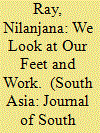

|
|
|
|
|
| Summary/Abstract |
This is a case study of women workers in the informal construction sector who commute daily to the city of Kolkata in eastern India. While existing studies of women construction workers have considered their worker identity as primary, this study offers an alternative theorising, reading them as women whose identity as workers is embedded in other social identities. In-depth interviews with these women reveal that entrenched patriarchal norms and gender discrimination create structural vulnerabilities, which are in turn compounded by the risk of sexual abuse in the workplace. Nevertheless, the women exercise agency and access jobs with favourable wages through bonding and bridging relationships in a sector dominated by men.
|
|
|
|
|
|
|
|
|
|
|
|
|
|
|
|
| 14 |
ID:
191709


|
|
|
|
|
| Summary/Abstract |
Since the 1970s, a network of Sindhi housewives in Singapore has met monthly to feast and socialise. At every meeting, each member pools in cash to form the ‘kitty’—the prized sum won by a lucky recipient of the draw. The size of the contribution is a measure of the group’s exclusivity. Indeed, these are affluent women who seem to have no apparent need for the money. Rather, they indulge in incessant bickering over car-pooling, consumption practices and about how to break down the lunch bill. Though members are regularly absent, exiting the group is a rarity. But why stay, and why have a kitty? This essay probes into the social value of the kitty group, identifying it as a critical space for the women’s independence beyond the household where they actively engage in status production. Their participation secures their identities as upper-class Sindhi women, as ‘housewives’ and as ‘aunties’.
|
|
|
|
|
|
|
|
|
|
|
|
|
|
|
|
|
|
|
|
|